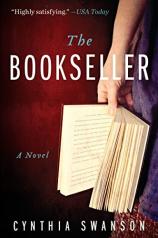Reading Group Guide
Discussion Questions
The Bookseller

1. The novel begins with a friendly disagreement when Frieda suggests that Kitty’s newly painted yellow bedroom has “too much sunniness.” What does this reveal about each of them?
2. Of what significance is it that the novel is set in the 1960s? That Kitty lives in the city, and Katharyn in a suburban neighborhood?
3. Examine what the society of the time expects from, allows, or forbids women. In what ways do the characters of Frieda, Kitty, and Katharyn push against such definitions? What empowers each of them to do so?
4. Frieda offers the simple and profound idea that “you can’t have it all, sister.” Is this still true for women today? If so, what are some mutually exclusive philosophies and/or goals women must choose between?
5. At one point Kitty changes her name to Katharyn. How does each name suit her? What power or influence does one’s name have?
6. Why do you think we dream? What does the main character learn from her dreams? What have you learned from your dreams?
7. At one point in Kitty’s struggle to understand her predicament she says her mind is playing tricks on her and is “using [her] body as a clever prop.” How do the mind and body work with or against each other in times of distress?
8. Kitty calls the imagination a “remarkably clever and hardworking creature.” In what ways might an overly active imagination become problematic or even unhealthy?
9. Consider the many literary works mentioned throughout the novel. Which, if any, have you read? What’s the particular significance of Ray Bradbury’s SOMETHING WICKED THIS WAY COMES? Or Katherine Anne Porter’s SHIP OF FOOLS?
10. What role does music --- especially that of Patsy Cline --- play in the novel?
11. Think about the many sources of information Swanson employs in the telling of the story: old letters, postcards, books, newspaper articles, microfilm. What are the benefits of telling a story in such a way?
12. What does the character of Kitty’s mother bring to the novel? Of what particular importance are the postcards she sends?
13. What does Alma bring to the novel?
14. It’s often said of teaching that a good teacher learns as much as the student does. Kitty makes impassioned and creative efforts to teach her young neighbor Greg Hansen to read. What does Kitty learn from this experience?
15. What complexities are introduced with Michael? What effects do the 1960s medical theories about the nature and causes of autism have on Katharyn?
16. Of Lars’s many good qualities, which are most helpful to Katharyn?
17. Why do you think Swanson chose to make Katharyn’s husband so close to perfect?
18. What many and varied elements help Katharyn recover from her “heartbreaking triumvirate”?
19. The story line suggests that very different lives might result for a person simply because of timing, even a matter of seconds. Examine the “missed moments” that may have sent your own life on a different path.
20. In a time of great frustration Kitty concedes that “there is no such thing as a perfect life.” What does Kitty learn, and what can we learn, if we accept this as truth?
The Bookseller
- Publication Date: March 22, 2016
- Genres: Fiction, Historical Fiction
- Paperback: 368 pages
- Publisher: Harper Paperbacks
- ISBN-10: 0062333011
- ISBN-13: 9780062333018








